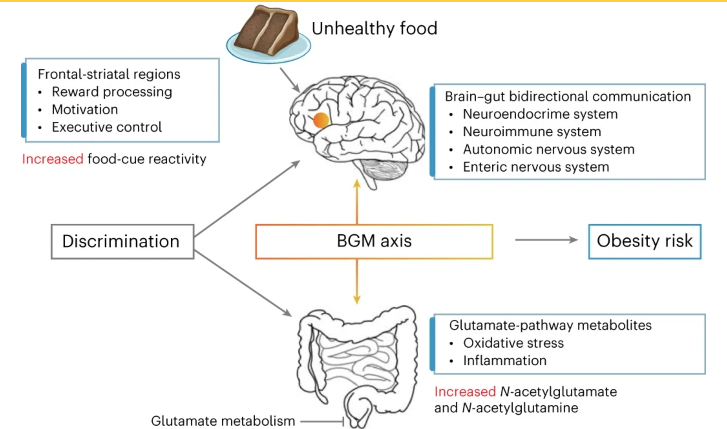💡 This study explores the intricate relationship between discrimination, brain reactivity to food cues, and alterations in the gut microbiome and metabolites, shedding light on potential mechanisms linking discrimination to obesity
📌 Employing multi-omics analyses involving neuroimaging and fecal metabolites, the study indicates that discrimination is linked to heightened food-cue reactivity in brain regions associated with reward and executive control.
📌These disruptions in the brain-gut-microbiome axis may lead to unhealthy eating behaviors and an increased risk of obesity.
📌 The study hypothesizes that discrimination-induced stress may lead to altered brain reactivity towards unhealthy foods and dysregulations in glutamate metabolism, ultimately promoting unhealthy eating behaviors and obesity.
📌 Methods:
The study utilized multi-omics analyses, involving neuroimaging and fecal metabolites, to investigate the impact of discrimination exposure on brain reactivity to unhealthy and healthy food cues, as well as on gut metabolites related to glutamate metabolism.
The participants self-reported their experiences of discrimination, and brain reactivity to food cues was assessed using functional magnetic resonance imaging. Fecal samples were collected to analyze gut metabolites.
📍 The study revealed that discrimination is associated with heightened brain reactivity to unhealthy food cues in regions associated with reward processing and executive control. Additionally, discrimination was linked to altered levels of gut metabolites involved in glutamate metabolism, oxidative stress, and inflammation.
📍 Specifically, discrimination was associated with higher levels of N-acetylglutamate and N-acetylglutamine, suggesting potential implications for glutamate levels and neuroinflammatory processes.
Modulating gut microbiota through diet, prebiotics, or probiotics may help influence gut metabolite production and improve metabolic health.
Link to the article: https://lnkd.in/dvuRkaeE
